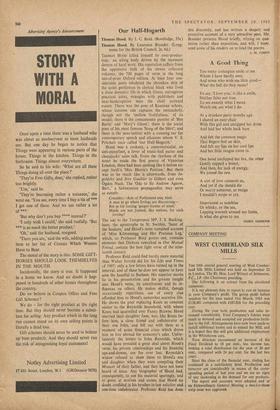Our Half-Hogarth
Thomas Hood. By J. C. Reid. (Routledge, 35s.) THOMAS HOOD killed himself by over-produc- tion: an ailing body driven by the incessant demon of hard work. His reputation suffers from the oppressive bulk of his eleven collected volumes, the 700 pages of verse, in the long out-of-print Oxford- edition. At least four con- siderable poets inhabited the shrunken skin of the quiet gentleman in clerical black who lived a close domestic life in which illness, outrageous practical jokes, wrangles with publishers and near-bankruptcies were the chief outward events. There was the poet of Keatsian echoes, whose autumn ode captures the melancholy, though not the 'mellow fruitfulness,' Of its model; there is the consummate punster of 'Ben Battle' and 'Mary's Ghost'; there is the social poet of his most famous 'Song of the Shirt'; and there is the near-satirist with a cunning ear for contemporary speech and allusions whom V. S. Pritchett once called 'our Half-Hogarth.'
Hood was a cockney, a controversialist, an anti-pussyfoot, a lover of music-hall patter and cheapjacks' sales talk. From the rhythms of the street he made the first poetry of Victorian London; there had been nothing like it before ex- cept Swift's 'Mrs. Harris's Petition.' But there was to be much like it afterwards, from In- goldsby and Bon Gaultier to Gilbert and even Ogden Nash. The 'Ode to Sir Andrew Agnew, Bart.,' a Sabbatarian propagandist, may serve as sample.
Consider,—Acts of Parliament may bind A man to go where livings are discoursing— But as for forcing 'proper frames of mind,'
Minds are not framed, like melons, for such forcing!
• The ode to the Temperance MP, J. S. Bucking- ham; the apostrophe to St. Swithin, 'Saint of the Soakers,' and Hood's most sustained account of 'Miss Kilmansegg and Her Precious Leg,' which, as Professor Reid points out, contains elements that Dickens reworked in Our Mutual Friend, contain the best light verse of the nine- teenth century.
Professor Reid could find hardly more material than Walter Jerrold did for his Life and Times of 1907; only a few letters have turned up in the interval, and of these he does not appear to have seen the handful to Barham. His superior merits lie in his presentation and his greater insight into Hood's verse,, its constituents and its in- fluences on others. He makes skilful, though occasionally repetitious, use of every clue afforded him to Hood's somewhat secretive life. He shows the poet replacing Keats as constant visitor to the Reynolds household, with whom Keats had quarrelled over Fanny Brawne. Hood married their daughter Jane, was, like Keats be- fore him, a close friend and collaborator of their son John, and fell out with them at a moment of acute financial crisis which drove him to live abroad for economy's sake. Unfor- tunately the letters to John Reynolds, which would have revealed a great deal about Hood's verse, his private relationships and his financial ups-and-downs, are for ever lost. Reynolds's widow refused to show them to Hood's son and daughter when they were compiling their Memoir of their father, and they have not been heard of since. Any biographer of Hood had, consequently, to use his material sparingly, and to guess at motives. and events that Hood no doubt confided in his brother-in-law solicitor and one-time collaborator. Professor Reid has done this discreetly, and has written a shapely and attractive account of a very attractive poet. Mr. Brander presents Hood briefly, relying on quo- tation rather than exposition, and will, I hope. send some of his readers on to read the poems.
J. M. COHEN






































 Previous page
Previous page